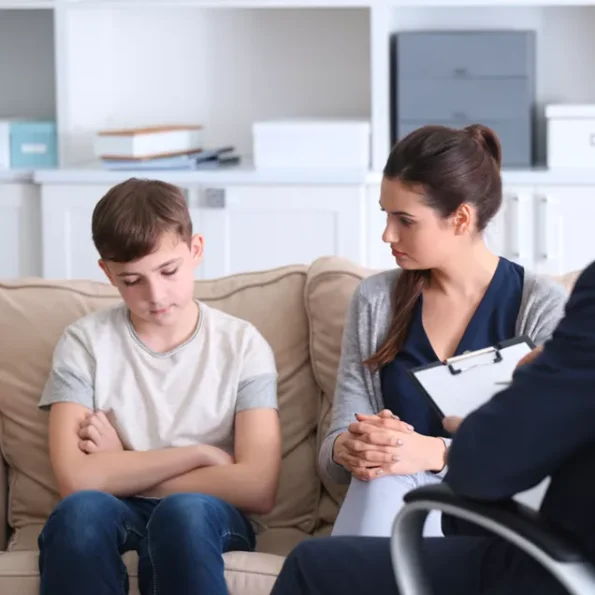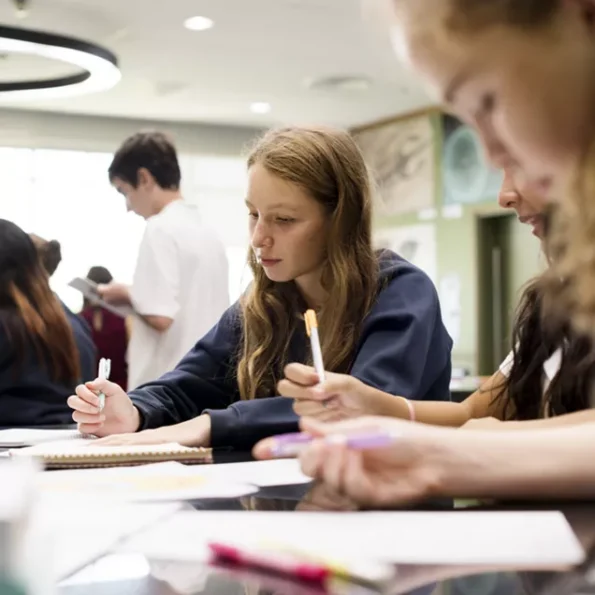
Has your child been excluded from school?
Here’s everything you need to know about exclusions as a foster parent.
Jump to:
School exclusions for children in care
We know that the exclusion phone call certainly won’t be the best conversation you have this week, but the good news is that there are lots of routes back into education for a child who has been excluded from school. To enable your young person to get back into education as quickly as possible, it’s vital that you’re prepared to deal with the exclusion aftermath and able to provide the right educational support.
It can be easy to place blame, and assume that an exclusion is simply the result of poor behaviour, but actually, it’s a far more complex issue which has huge implications for adults and children alike, particularly for looked after children.
If you’re here to find out exactly what to do if your child is excluded from school, this guide will give you everything you need to know.
Can a looked after child be excluded from school?
In short, yes. All children, regardless of their background or personal circumstances can be excluded, and it will come down to the headteacher to make the final call.
However, the headteacher and supporting staff should do everything possible to avoid suspending or expelling children in care. It’s important to remember that exclusion – whether fixed-term or permanent – can be hugely damaging to looked after children in particular.
What should a school do before a child is excluded from school?
Schools should maximise their resources and staff before settling on exclusion. As childcare professionals, we need to think holistically about our action plan, so that we can avoid excluding a looked after child.
Some considerations your young person’s school should make are:
- Providing the child with a buddy or mentor
- Implementing behaviour monitoring
- Communicating with you, your child’s social worker, your social worker and advisory teacher (if you’re fostering with ISP), and the virtual school
- Discussing educational strategies
- Rethinking the curriculum or timetable
- Risk assessing the young person
The expectations of going to school can be very challenging for children in care, and whilst they might need special educational provision to give them the best chance at success, schools must identify and manage where the young person’s exclusion risks lie before it’s too late.
Types of exclusion
Exclusion is when a child is removed from school as a result of their behaviour, either temporarily or permanently.
Fixed-term exclusion
This is when a child is suspended for a set number of days following an incident at school. Most often the exclusion period is three to five days and the child will be reintegrated into school on their return.
Permanent exclusion
Sadly, this does what it says on the tin and means that your child has been expelled, and is permanently excluded from school. If this is the case, you will now need to look for alternative schools for your child.
Foster parents should work with the child’s wider support network to find alternatives to expulsion, but sometimes it’s the hand we’re dealt and we have to make the best of that situation. If that’s the case, you should ask people for school recommendations, and look around quickly to make getting back into education as easy as possible.

What happens when a child is excluded from school?
There is no one-size-fits-all when it comes to school exclusions, and each case needs to be handled on an individual basis. But whether a child has been permanently excluded from school, or just suspended, we need to work hard to give them the best chance of getting back into education. An exclusion can be difficult to deal with, but it’s an obstacle we can easily overcome when we are well-prepared and surrounded by a knowledgeable and supportive team as we have at ISP.
If a child has been excluded from school on a temporary basis, they will be required to complete school work at home, and stay away from school for the duration of that suspension. They will then rejoin their classmates when their exclusion is up.
Should a child be expelled from school, they will still have work to complete at home which has been provided by the school or local authority (LA), but meanwhile, you must find an alternative educational provision for them.
What are the steps following an exclusion?
The exclusion process can differ from school to school, but this is the typical pathway…
Fixed term exclusion
- Guardian contacted – the school will contact the foster parent to inform them of the exclusion.
- Child collected from school – the foster parent then has to collect the child and bring them home.
- Meeting at school – there will be a meeting between the foster parent(s) and the school head to confirm the terms of the exclusion.
- Exclusion is recorded – a full record will be made and kept. Schools are required by law to keep their students’ records for a certain period of time, including their disciplinary track record.
- Corporate parent informed – all care professionals involved in the child’s care need to be informed of the exclusion so that the child can be appropriately supported.
- School work is provided – the school has a duty of care for the young person, and will provide them with work to do whilst at home.
- Exclusion officially starts – the child will stay at home for three to five days, where they will complete work provided by the school before going back.
- Reintegration – when the fixed-term is complete, a child returns to school to resume their education as normal.
Permanent exclusion
- Home contacted – the school will contact the foster parent to inform them of what has happened.
- Child collected from school – the foster parent then has to collect the child and bring them home.
- Meeting at school – there will be a meeting between the foster parent(s) and the school head to confirm the terms of the exclusion.
- Exclusion is recorded – exclusions are serious business, and full records of the incident need to be kept. A school is legally obliged to keep hold of a child’s record, including their disciplinary history.
- Corporate parent informed – all care professionals involved in the child’s care need to be informed of the exclusion so that the child can be appropriately supported.
- Alternative provision sought – the child’s needs should be identified so that an appropriate new school can be found.
- Work provided to the child in the interim – schools have a duty of care for their students, even if they have been expelled. Your child’s school, local authority, or both, will provide work depending on how long it takes to find a new school for the child.
- New school – every care should be taken to find a new school that is the right fit for the child. Once this has happened, the child can enrol at their new school and resume their studies.
Can you appeal a school exclusion?
Yes, but it’s important to remember that appeal processes can differ from school to school. You might want to appeal a permanent exclusion to a fixed-term exclusion, or negotiate a fixed-term exclusion’s duration, or the fact that it has been given out at all.
There are a number of reasons that you can appeal a school exclusion:
- If you feel the school has made a mistake
- If the exclusion was based on discrimination
- If the exclusion was unfair
- If it was under mitigating circumstances, such as a bereavement

The appeal process
To get the ball rolling you need to make the appeal in writing, and send it to your board of governors. You will then be invited to a review, alongside other professionals including the chair of governors, social worker, and virtual school team.
You will need lots of evidence for why you feel that the exclusion has been wrongly made and this should be presented at the review. The evidence may include more detail about the child, facts or experiences that the school might not have considered or even the child’s own voice.
If your appeal is still unsuccessful you can contact the Academy Trust or the local authority with another appeal. Always remember to check with your school to find out the appropriate process for the child in your care.
A foster parent’s role throughout an exclusion
Each exclusion is as different as the child being excluded, so each case needs a person-centred approach to ensure that the best decisions are being made for the individual. An exclusion can certainly be a difficult time to navigate, but it is vital to the young person’s wellbeing that they know someone is still, unwaveringly, on their side.
At ISP, we encourage our foster parents to see an exclusion as a fresh start. You should use this time to listen to the child and make sure they feel validated, whilst reflecting on what happened and supporting the child to understand that they didn’t make a good choice this time.
Whilst you’re going through the fine detail, you might realise that there were underlying causes of the behaviour, and it’s at this time that you will need to communicate with your support team and other professionals so that everyone can see exactly what happened.
Advisory teachers are on hand to support foster parents to get to the bottom of what happened at school, but also to build the child back up, educationally, at home. Lots of young people will feel embarrassed and a sense of shame from being excluded, so it’s crucial that they feel safe and supported. By unravelling what happened, you can start to understand the child’s emotions, and help them on the road to no more exclusions.
Advocacy services for foster parents
Having the right support around you during an exclusion process can make all the difference. Whilst the role of the foster parents is to advocate for their young person, the team at ISP is always available to support foster parents through school exclusions.
There should always be open communication concerning what’s best for an excluded child, and we urge foster parents to utilise the network around them – the social worker, the virtual school, the advisory teacher – so that we can always enable the best outcomes for our children and young people and avoid them being permanently excluded from school wherever possible.
Already fostering?
Whether things aren’t working out with your current agency or you want to hear about the fantastic work we do at ISP using therapeutic fostering, we’d love to hear from you.
Get in touch today and our fostering experts will be on hand to answer your questions.
Exclusion and looked after children – what’s the link?
The sad truth is that children in care are three times more likely to be excluded from school than their non-looked-after peers. Attachment difficulties, loss, and trauma all play a huge role in how children and young people relate to others, and behavioural difficulties are just one of the ways that our young people’s turbulent pasts can surface day-to-day, even if that young person is now in a safe environment.
For children in care, their foster parents’ home is often the safest place in the world to be. School, on the other hand, is jam-packed with new people, rules and regulations, and challenging situations; children will often do anything to get out of a scary place and exclusion is just another way of doing that.
Educational professionals and foster parents need to work collaboratively to understand the very specific needs of that young person so that their voice can be heard and their feelings validated.

The effects of exclusion on looked after children
Looked after children can find it difficult to regulate their emotions and comply with social expectations, so it can be hard for them to understand just where they went wrong with their behaviour. Confusion, reduced confidence, and low self esteem are some of the emotional implications for a child who has been excluded from school.
Rejection also plays a huge role in what is going on under the surface after a child has been excluded. Our young people have often suffered trauma, neglect, and carry a lot of shame, so an exclusion to them could be another in a long line of rejections. Therapeutic care enables us to explore the situation and all of the options available to us so, meaning that your child’s head teacher has only settled on exclusion when all the alternatives have been exhausted.
How can we support our young people?
We can more easily unpick our childrens’ behaviours when we remember that trauma can lead to:
- Poor planning skills
- Poor organisational skills
- A lack of emotional control
- Difficulties starting new activities
- Difficulties transitioning between activities
- Memory difficulties
When a child goes to school, they are expected to conform to social norms which they might be experiencing for the first time. High expectations, and very little leeway, can result in an entirely overwhelming situation. If structure of this kind was never present in their lives until now, it can lead to a really tricky adjustment period as they try to adapt to a new way of life and societal norms.
Unravelling the complexities of how trauma affects us every day doesn’t mean we’re making excuses for our young people’s behaviour, but rather understanding it, so that we can provide well-informed, loving, and therapeutic support.
Can we really make a difference?
It might seem like the odds are stacked against our children and young people, but it’s important to know that lots of young people in care will excel in their education. It’s our role as foster parents, teachers, and childcare professionals to nurture our young people.
By understanding the roots of their behaviour, communicating openly and raising awareness about the impacts of trauma, we will be able to provide an educational environment where our young people can truly
How we support our foster parents at ISP during an exclusion
At ISP we know that our foster parents deliver an incredible level of care and support to the children and young people that we look after. Our foster parents are kind, knowledgeable,and understanding people – but we know that they are not teachers and will sometimes need help of their own. At ISP we believe having a strong network of supportive professionals around you is essential if you want to provide the best standard of therapeutic care.
We have an expert team at ISP including social workers, fostering advisors, therapists, and advisory teachers – who are on hand to help and provide advice if your child is temporarily or permanently excluded from school.
Excluding a looked after child can be stressful for both parents and children, and sometimes the only solution is to spend some time apart to decompress. Each case is different, but sometimes a period of respite can be a really good option to allow everyone involved time to reflect.
If our foster parents feel like respite is the best option for their family following an exclusion, ISP will do everything it can to provide support as quickly as possible, while protecting and meeting the needs of the young person.
Education Hub

Help a child go back to school
Many children in care will miss parts of their education. Here’s how you can support their transition back into school.

My child won’t go to school
We explore some of the reasons why a child in your care may be refusing to go to school and what you can do to help.

Education, Health & Care Plans
Everything you need to know about EHCPs including who’s eligible, what the plan covers, and how to apply.